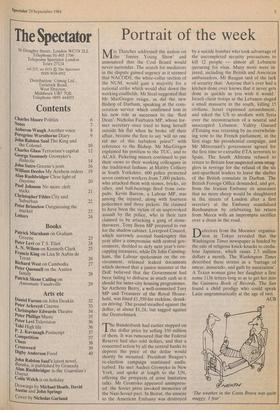Portrait of the week
Mrs Thatcher addressed the nation on the 'Jimmy Young Show' and announced that the Coal Board would never surrender. The search for mediators in the dispute gained urgency as it seemed that NACODS, the white-collar section of the NUM, would gain a majority for a national strike which would shut down the working coalfields. Mr Steel suggested that Mr MacGregor resign, as did the new Bishop of Durham, speaking at the cons- ecration service which confirmed him in his new role as successor to the 'Red Dean'. Nicholas Fairbairn MP, whose for- mer secretary once tried to hang herself outside his flat when he broke off their affair, became the first to say 'will no one rid me of this turbulent priest?' with reference to the Bishop. Mr MacGregor explained his position to the TUC, and to ACAS. Picketing miners continued to put their views to their working colleagues in the traditional fashion: at Maltby Colliery in South Yorkshire, 600 police protected seven contract workers from 7,000 pickets, who attacked them with stones, bricks, air rifles, and ball-bearings fired from cata- pults. Kevin Barron, a Labour MP, was among the injured, along with fourteen policemen and three pickets. He claimed to have been the victim of an unprovoked assault by the police, who in their turn claimed to be attacking a gang of stone- throwers. Tony Benn MP prepared to run for the shadow cabinet. Liverpool Council, which narrowly averted bankruptcy this year after a compromise with central gov- ernment, decided to defy next year's rate- capping measures, while Dr John Cunning- ham, the Labour spokesman on the en- vironment, released leaked documents which showed that a junior minister at the DoE believed that the Government had been failing to disburse as much cash as it should for inner-city housing programmes. Sir Anthony Berry, a well-connected Tory MP and Treasurer of the Royal House- hold, was fined £1,350 for reckless, drunk- en driving. The pound steadied against the dollar, at about $1.24, but sagged against the Deutschmark.
he Bundesbank had earlier stepped on 1. the dollar price by selling 350 million of them. It was rumoured that the Federal Reserve had also sold dollars, and that a concerted action by all the central banks to depress the price of the dollar would shortly be mounted. President Reagan's re-election campaign continued undis- turbed. He met Andrei Gromyko in New York, and spoke at length to the UN, offering the prospects of arms limitation talks. Mr Gromyko appeared unimpress- ed: the Soviet press invoked memories of the Nazi-Soviet pact. In Beirut, the annexe to the American Embassy was destroyed
by a suicide bomber who took advantage of the uncompleted security precautions to kill 12 people — almost all Lebanese queueing for visas. Many more were in- jured, including the British and American ambassadors. Nit Reagan said of the lack of security that: 'Anyone that's ever had a kitchen done over knows that it never gets done as quickly as you wish it would.' Israeli client troops in the Lebanon staged a small massacre in the south, 'killing 15 civilians. Israel expressed astonishment, and asked the US to mediate with Syria over the reconstruction of a neutral and unoccupied Lebanon. Valery Giscard d'Estaing was returning by an overwhelm- ing vote to the French parliament, in the first stage his presidential campaign, and Mr Mitterrand's government agreed for the first time to extradite ETA terrorists to. Spain. The South Africans refused to return to Britain four suspected arms smug- glers in revenge for the refusal of the six anti-apartheid leaders to leave the shelter of the British consulate in Durban. The British Foreign Office demanded, and got, from the Iranian Embassy an assurance that no more sheep would be slaughtered in the streets of London after a first secretary at the Embassy scandalised Roehampton by celebrating his return from Mecca with an impromptu sacrifice over a drain in the road.
Defectors from the Moonies' organisa- tion in Tokyo revealed that the Washington Times newspaper is funded by the sale of religious knick-knacks to credu- lous Japanese, which raises 2.5 million dollars a month. The Washington Times described these stories as a 'barrage of smear, innuendo, and guilt by association'. A Texan woman gave her daughter a first name 1136 letters long so as to get her into the Guinness Book of Records. The Sun found a child prodigy who could speak Latin ungrammatically at the age of two.
ACB
'The weather in the Costa Brava was quite, muggy, I fear'














































 Previous page
Previous page